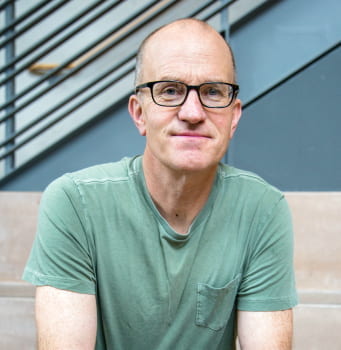
Category: QB3 News
-
Raising a glass (and funds) for research
Michael David Winery helps fund professor’s COVID-19 research with “Going Viral” Merlot From: UCSC, Dan White Michael Phillips had been looking for an eye-catching, thoughtful way to honor the groundbreaking and lifesaving work of his daughter, the virologist Rebecca DuBois, UC Santa Cruz associate professor of biomolecular engineering. That’s why he and his brother, David,…
-

Steck Award recipient helps discover protein involved with circadian clock timing
UCSC Every once in a while, professors meet a student who seems destined to be a star in their field. For Carrie Partch, UC Santa Cruz associate professor of chemistry and biochemistry, one of those students is Alfred Freeberg, this year’s winner of the prestigious Steck Family Award. The award is given for an outstanding…
-

New optical technique provides more efficient probe of nanomagnet dynamics
Optical analysis of nanomagnets is achieved by directing a laser pulse at gratings designed to generate surface acoustic waves and focus the vibrational energy of the waves on individual nanomagnets. (Cover image, Applied Physics Letters, May 26, 2020)
-

UCSC-QB3 researchers are combatting the coronavirus on multiple fronts
From developing diagnostic tests to conducting surveys of infection prevalence, UCSC-QB3 researchers are on the offense, responding to the COVID-19 pandemic with science. Here are the highlights.
-

New program advances global and community health
“I think the extent to which we can show students the possibilities of contributing to public health and to health-care careers, which after all, are 20 percent of our economy, we’re going to do good things both for our local community, but more broadly for the country and the world,” Hartzog said. UCSC | Jessica…
-

UC Santa Cruz scientists to provide rapid COVID-19 testing by end of month
KSBW While doctors and nurses treat COVID-19 patients on the front lines, behind the scenes scientists are working hard in their labs to come up with ways to battle the pandemic. One thing University of California, Santa Cruz scientists are working on is to create a diagnostic testing lab on campus that will meet the…
-
UCSC researchers are taking on the coronavirus challenge on multiple fronts
UCSC The UC Santa Cruz campus has been eerily quiet since stay-at-home orders went into effect to limit the spread of the coronavirus causing the COVID-19 pandemic. Faculty are adapting to teaching classes online, and research labs have had to shut down much of their work. Nevertheless, many UCSC researchers are finding ways to apply…
-

Molecular switch mechanism explains how mutations shorten biological clocks
UCSC A new study of molecular interactions central to the functioning of biological clocks explains how certain mutations can shorten clock timing, making some people extreme “morning larks” because their internal clocks operate on a 20-hour cycle instead of being synchronized with the 24-hour cycle of day and night. The study, published February 11 in…
-

Better protection from the flu could be on the horizon
UCSC The current flu season is shaping up to be a particularly severe one, with the Centers for Disease Control and Prevention (CDC) reporting 2,900 deaths from flu as of the end of December. Vaccines offer protection from this threat, but getting the flu vaccine every year can be a hassle, and many adults go…
-

Biologist Doug Kellogg receives Outstanding Faculty Award
UCSC Doug Kellogg, professor of molecular, cell, and developmental biology at UC Santa Cruz, has received the 2018–19 Outstanding Faculty Award from the Division of Physical and Biological Sciences (PBSci). The annual award is the division’s highest honor for faculty achievement, recognizing combined excellence in research, teaching, and service. “Doug Kellogg is a worthy recipient…
-

Optofluidic chip with nanopore ‘smart gate’ developed for single molecule analysis
Programmable device enables on-demand delivery of individual biomolecules with feedback-controlled gating for high-throughput analysis UCSC A new chip-based platform developed by researchers at UC Santa Cruz integrates nanopores and optofluidic technology with a feedback-control circuit to enable an unprecedented level of control over individual molecules and particles on a chip for high-throughput analysis. In a…
-

Built from scratch
Inquiry @ UC Santa Cruz Vaccines are one of history’s most important medical advances, shielding large swaths of humanity from more than a dozen diseases. Worldwide, experts estimate that measles vaccinations alone have saved more than 17 million lives since the year 2000. In the United States, as a National Academies report put it in 2003, vaccines are…